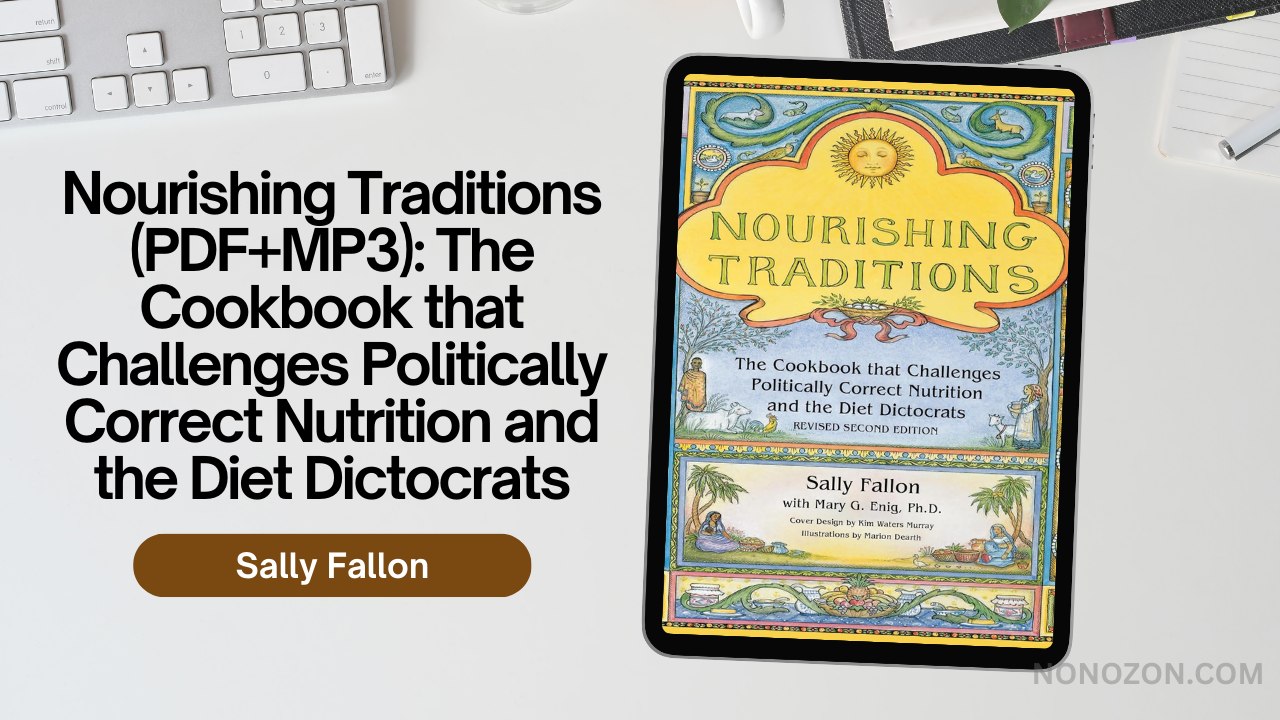Nourishing Traditions (PDF+MP3): The Cookbook that Challenges Politically Correct Nutrition and the Diet Dictocrats
by Sally Fallon
Review of Nourishing Traditions: The Cookbook That Challenges Politically Correct Nutrition by Sally Fallon
Check proof of content here:

In today’s world, where nutritional guidelines are constantly shifting and often conflicting, many find themselves struggling to navigate the maze of advice. Sally Fallon's Nourishing Traditions: The Cookbook That Challenges Politically Correct Nutrition offers a refreshingly different perspective, drawing on ancestral wisdom to promote a more natural and wholesome approach to eating. Fallon, as president of the Weston A. Price Foundation, leverages her research to advocate for a return to traditional dietary practices that emphasize whole, nutrient-dense foods. This book is not simply a collection of recipes; it is a philosophical exploration of nutrition, challenging modern dietary trends and encouraging a deeper understanding of the foods we eat. In this review, we will explore the core concepts of the book, its benefits, drawbacks, and how its ideas apply to contemporary eating habits.
The Core Concepts of Nourishing Traditions
At the core of Nourishing Traditions is the philosophy of ancestral nutrition. Fallon argues that the rise of industrialized food production has distanced us from the dietary practices that supported human health for generations. She suggests that modern diets, heavily reliant on processed foods, have contributed to a host of health issues such as obesity, diabetes, and certain cancers. In contrast, Fallon champions the consumption of whole, unprocessed foods, advocating for a return to traditional eating habits that nourish the body in more complete ways.
The book features over 700 recipes focused on whole foods such as organic meats, fresh fruits, seafood, and raw dairy products. Fallon stresses the importance of traditional food preparation methods like making bone broth, fermenting vegetables and dairy, and soaking grains and nuts. These methods enhance the nutritional value of foods while also aligning with our digestive system’s natural processes, leading to better health outcomes.
The Role of Animal Fats
One of the more controversial aspects of Fallon’s argument is her strong emphasis on the health benefits of animal fats. Unlike the mainstream advice that typically advises limiting fat intake to prevent high cholesterol, Fallon makes a case for saturated fats, particularly those found in animal products, as essential for overall health. She cites a growing body of research that supports the idea that quality fats play an important role in hormone production, brain health, and even weight management.
Fallon’s views challenge long-standing dietary beliefs, such as the notion that saturated fats are harmful. For example, a 2010 study published in the American Journal of Clinical Nutrition found no significant link between saturated fat intake and coronary heart disease, which contradicted previous assumptions. By promoting the inclusion of healthy fats, Nourishing Traditions sparks a broader discussion about nutrition, encouraging readers to rethink conventional dietary guidelines.

Advantages of Nourishing Traditions
The book has been praised for promoting a range of beneficial dietary practices. Some of the key advantages include:
Whole Foods Focus: The book encourages the consumption of whole, unprocessed foods, a departure from the refined grains and sugar-heavy foods common in modern diets.
Traditional Cooking Methods: Fallon emphasizes the nutritional value of traditional food preparation techniques, such as fermentation and soaking, which not only improve food’s digestibility but also enhance its nutrient profile.
Anti-Processed Foods Stance: The book strongly opposes processed foods, refined sugars, and artificial sweeteners, advocating instead for real, nutrient-dense foods that nourish the body.
The book is also well-researched, drawing upon scientific studies, historical examples, and traditional wisdom to validate its claims. This foundation provides readers with a solid understanding of the principles behind traditional nutrition and helps to ground the book’s advice in both historical context and modern scientific understanding.
Drawbacks to Consider
While Nourishing Traditions offers a compelling approach to nutrition, there are some criticisms worth noting:
Time-Consuming Recipes: Many of the recipes require significant time and effort to prepare. This could be a deterrent for individuals with busy lifestyles or those new to traditional cooking.
Not Focused on Weight Loss: The book does not emphasize weight loss, which could be a limitation for readers looking for a diet specifically aimed at shedding pounds quickly.
Food Safety Concerns: The book advocates the consumption of raw dairy and other raw foods, which raises potential concerns about foodborne illnesses. While these foods are staples in traditional diets, modern food safety standards may make some readers cautious about incorporating them into their diets.
These drawbacks suggest that while the philosophy presented in Nourishing Traditions is valuable, it may not be practical for everyone, especially those seeking quick results or with limited time for food preparation.
Conclusion
Nourishing Traditions offers a thought-provoking challenge to the conventional dietary advice that dominates modern nutrition. By advocating for a return to ancestral eating practices, the book encourages readers to embrace whole, nutrient-dense foods and traditional cooking methods that have been key to human health for centuries. Although the book’s approach may not suit everyone, particularly those with limited time or looking for rapid weight loss results, it provides a comprehensive and well-researched perspective on nutrition. For those open to rethinking their dietary choices, Nourishing Traditions offers a wealth of insights that could transform the way we approach food. Whether through the promotion of whole foods, healthy fats, or time-honored cooking techniques, the book provides valuable guidance for those seeking to improve their diet in a sustainable and nourishing way.


